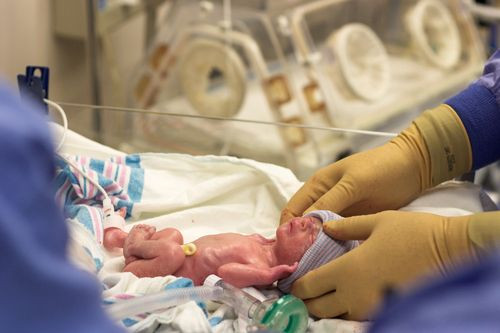Gloves After Hand Washing Best Protects Preemies From Infections In Neonatal Intensive Care Unit

Premature babies are more susceptible to infections due to their underdeveloped immune systems. So caregivers and medical staff who handle these babies in a neonatal intensive care unit (NICU) need to be extra cautious when it comes to hygiene. One of the ways to reduce infections, according to a new report, is to wear gloves after hand washing before contact, rather than just washing hands.
Preterm babies in the intensive care may need intravenous fluids, catheters, and intubation tubes, making them vulnerable to infections due to infected devices. Infections may develop even 72 hours after birth. Known as late-onset infections, these include sepsis and meningitis. These along with necrotizing enterocolitis, a serious intestinal disease caused when tissues in the intestine get injured, can cause neurodevelopmental disorders or even death in extremely premature babies.
While hand washing is routinely followed by medical staff, it may not be enough to kill all the germs in their hands, and 50 percent of them still persist. Preterm babies due to their immature immune systems, underdeveloped organs, skin, and mucosal membranes can get infected by these germs. Moreover, several times necrotizing enterocolitis affects babies in the same nursery, suggesting that it may spread through health workers handling babies.
The study authors, headed by David A. Kaufman from the University of Virginia School of Medicine, wanted to check if wearing nonsterile gloves after washing hands and before all direct patient, bed and/or catheter contact, compared with hand washing alone, would prevent late-onset infections or NEC in preterm babies. The study tracked 120 infants who weighed less than 1,000 grams and/or had a gestational age of less than 29 weeks and were less than eight days old. The babies were all from a single hospital and the study was conducted over a 30-month period from December 2008 to June 2011.
Infants were divided in two groups: 60 infants in group A were handled with nonsterile gloves after hand washing and 60 infants in group B with hand washing alone. Late-onset invasive infection or NEC occurred in 32 percent of infants (19 of 60) in group A compared with 45 percent of infants (27 of 60) in group B. Group A also had 53 percent lesser gram-positive infections compared with group B and 64 percent lesser central line-associated bloodstream infections.
"This readily implementable control measure to reduce infections in preterm infants while they have central or peripheral venous access warrants further study in this and other patient populations,” said the authors in a statement.
Susan E. Coffin, from the University of Pennsylvania, wrote about the study:
While planning their study, the investigators used current data from their institution on the incidence of late-onset infection among extremely low-birth-weight infants to calculate a sample size that would allow them to detect a clinically relevant difference in outcome. Unfortunately for the investigators – but fortunately for their patients – the background rate of late-onset infections appears to have dropped significantly from the time they performed their sample size calculations to the study period (from 60 percent to 45 percent), thus rendering their study underpowered.
She goes on to say that while the use of gloves to increase hygiene has been endorsed by several medical practitioners, more studies on infection prevention trials are needed before the universal use of gloves in neonatal care.
Source: Kaufman D, Blackman A, Conaway M, Sinkin R. Nonsterile Glove Use in Addition to Hand Hygiene to Prevent Late-Onset Infection in Preterm Infants. JAMA. 2014.
Published by Medicaldaily.com



























